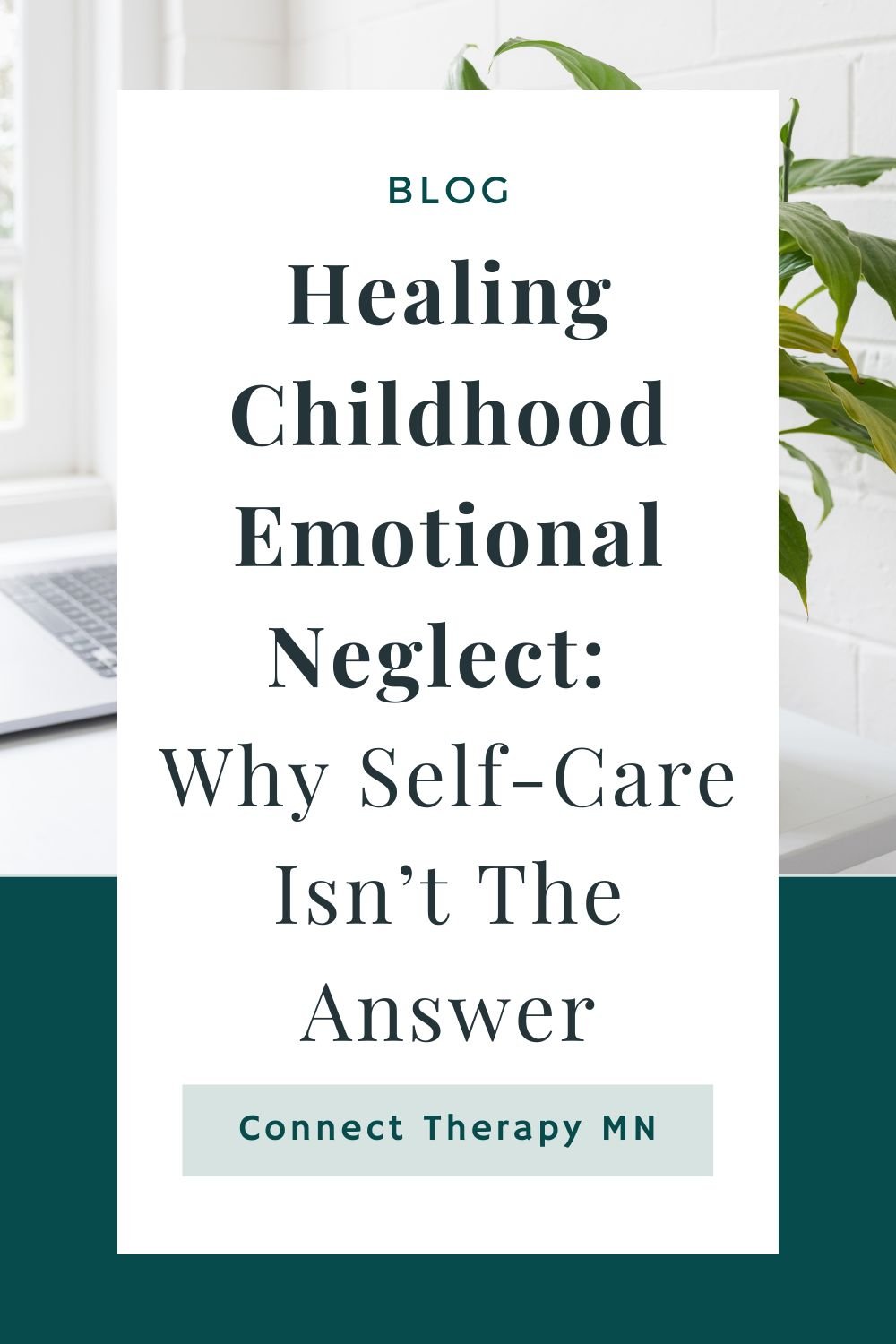Healing Childhood Emotional Neglect: Why Self-Care Isn’t The Answer
This blog covers:
Definition of self-care
5 Requirements of self-care (aka barriers for people with CEN)
Definition of community care and why it’s helpful
13 Benefits of joining a support group for CEN
“You need to make time for self-care!”
“You have to put yourself first!”
How often have you heard these statements? I’m constantly running across social media posts “reminding” us to take care of ourselves.
And honestly - it irks me.
While l get the sentiment, I find it unhelpful at best and harmful at worst, especially for people who have experienced Childhood Emotional Neglect (CEN).
First let’s define self-care because the definition that I like to use helps explain my annoyance with it.
Definition of Self-Care:
A practice of reminding yourself that you are worth being cared for.
In addition,
Self-Care Requires 5 Things:
A belief that you matter.
Connection to your feelings as they tell us what we need, when we need it, and enables us to enjoy it.
Self-knowledge to identify what it is we want/need/like/enjoy.
Boundaries to help you prioritize your time/energy/resources to ensure that you follow-through with the self-care activity.
Energy to mindfully follow through with whatever self-care activity you choose
And herein lies my issue with pushing people toward self-care as the solution to their struggles:
When a child experiences CEN, they do not get their emotional needs sufficiently met by their parent/caregiver. The impact of this experience leads to a child being left alone to deal with their feelings and life experiences. Yet without the brain development to be able to sufficiently handle their feelings, they will learn coping strategies that - while necessary and adaptive for survival in their family-of-origin for the short term - are maladaptive in the long term.
Oftentimes the learned coping strategies gained in childhood include internalizing a belief that:
Their feelings, wants, and needs don’t matter
They are unlovable and unworthy as they are
They can’t depend on others for help
Something is deeply wrong with them
They need to earn love
They can’t trust their own feelings and perceptions
So if the purpose of self-care is to remind yourself of your worth…but you don’t believe you are worthy…and you don’t even know (or trust) what you feel, and therefore struggle to identify what you need…and you can’t create boundaries to help ensure you get what you need…see where I’m going with this?
No wonder practicing self-care is a HUGE struggle for people who grew up with CEN!
People with CEN are ALREADY likely to put themselves last. They’re ALREADY struggling with feeling like they’re not worthy of taking a day off - even when they’re sick! They’re already likely to be going through life on autopilot versus with mindful intention due to a nervous system that learned to numb itself to cope with the pain. They’re ALREADY likely to feel even MORE anxious when faced with the question of “What do I want/need?”! And finally, dealing with the impact of CEN is draining; there’s rarely any energy left to “do something” for themselves, let alone enjoy it!
In addition - and this is a BIG addition:
Loving yourself and knowing your worth STARTS with being loved and viewed/treated as worthy by another person outside of you - namely your parents. If you don’t receive the message that you are loved and lovable from your parents, it’s incredibly difficult to just magically believe this about yourself as an adult.
Before I continue, I want to add that I’m not anti-self-care! I personally LOVE self-care and make a point to practice it daily, even if it’s just for 5 minutes that day! I am just not a fan of it being touted as a primary goal for CEN recovery.
So, what the heck can you do instead if you want to move forward from CEN?
I’ve got 2 words for you:
Community Care.
What is community care and why do I need it?
Mental Health America defines Community Care as:
A practice where individuals come together to provide support and assistance to one another.
Since CEN is a form of relational trauma, healing has to also be relational! Growing up with CEN is already a lonely experience, and this loneliness carries over into adulthood. From my work with CEN clients, they don’t need to continue their hyper-independent journey, figuring out life on their own. They don’t need more practice in keeping their thoughts, feelings, and needs to themselves.
What they need is more experiences where they are heard and validated. They need more opportunities to be told that they matter just as they are. That they don’t need to earn love and acceptance. They need to experience what it’s like to be allowed to just be themselves. And in order to get these healing experiences, they need other relationships in their lives.
But not just any relationships; relationships that are able to provide an emotionally safe environment. Relationships that don’t make them question where they stand. Relationships that provide explicit validation, encouragement, and tangible support without any strings attached.
THIS is why I created the Online CEN Support Group.
13 Benefits of joining a support group for CEN:
Feel less alone (and crazy!)
Feel seen, heard, and understood
Practice giving and receiving support
Practice relating to others in more effective ways
Practice noticing, processing, and communicating your thoughts and feelings in real time
Practice showing up in a relationship the way you’d want your relationships outside of group to resemble.
Gain more awareness of how you tend to navigate relationships (ie. Do you tend to hold back, only share about positive things/certain topics, do you become uncomfortable with certain emotions being expressed, etc.
Have more corrective emotional experiences, something that may not happen much outside of group
Get to practice skills in real time with others who are also learning (and therefore less judgmental and critical)
Experience what it’s like for others (who aren’t therapists!) to hold non-judgmental space for you…so you can then start doing the same for yourself.
Receive feedback from others that can help increase your own self-awareness, and self-compassion
Experience having someone depend on you in a healthy way (ie. Group members depend on each other to consistently show up for sessions, be supportive, maintain confidentiality, etc), and be held accountable in your own healing journey.
Relate to and see yourself in a new, more expansive way outside of the role you’ve always played
When you add it all up, self-care doesn’t come close to providing you with the benefits that community care does!
“Healing from Childhood Emotional Neglect is a relational process.”
Conclusion
Community care is an often overlooked and underutilized form of treatment for Childhood Emotional Neglect. But the benefits of having others around you who can provide safe space and corrective emotional experiences for you is critical for healing from this form of relational trauma. Repeated positive experiences like this can help rewire your brain from protection to connection. Plus, it can be a catalyst toward starting and maintaining your own self-care practice!
Hi! I’m so glad you’re here!
I’m Katie Egge, a Minnesota-based therapist and coach who’s passionate about providing the support, resources, and tools that people need to heal/prevent Childhood Emotional Neglect, and live the life they want.
*The first Online CEN Support Group has already started, but rest assured there will be more opportunities to join! I’ve got more support groups planned for this year, so stay tuned and make sure to join my newsletter to be the first to know when the next group launches!





